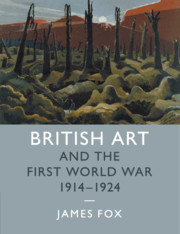Book contents
- Frontmatter
- Contents
- List of plates
- List of figures
- Acknowledgements
- Introduction
- 1 The outbreak of war and the business of art
- 2 Perceptions of art
- 3 The arts mobilize
- 4 War pictures: truth, fiction, function
- 5 Peace pictures: escapism, consolation, catharsis
- 6 Art and society after the war
- Conclusion
- Notes
- Bibliography
- Index
- Index
2 - Perceptions of art
Published online by Cambridge University Press: 05 August 2015
- Frontmatter
- Contents
- List of plates
- List of figures
- Acknowledgements
- Introduction
- 1 The outbreak of war and the business of art
- 2 Perceptions of art
- 3 The arts mobilize
- 4 War pictures: truth, fiction, function
- 5 Peace pictures: escapism, consolation, catharsis
- 6 Art and society after the war
- Conclusion
- Notes
- Bibliography
- Index
- Index
Summary
We have seen how the outbreak of war severely damaged the British art world. The conflict created a cocktail of social, political and financial problems that placed the cultural sphere under intense pressure from the start. Denied the money, men and materials on which its existence depended, the business of art repeatedly came close to collapsing. If conditions were not hard enough as they were, these concrete material difficulties were complemented and exacerbated by a set of cultural problems that were no less detrimental. The war gave rise to a set of discourses that fundamentally changed public perceptions of both art and artists. These perceptions may not have carried the quantifiable footprint of lost buyers, commandeered premises and vanished materials. Yet perceptions can be just as important as realities. Indeed, the French cultural historian Roger Chartier has argued that social representations – what he called the ‘social imaginary’ – are themselves ‘constituents of social reality’. And they are never more real, never more potent, than in wartime.
It has been said that a principal feature of ‘total war’ is the ‘refraction of the everyday’. Maureen Healey has written that during the First World War many social practices that had previously been considered private or sub-political were ‘refracted through the medium, or lens, of war’, and were reinterpreted accordingly. This chapter explores how the unfolding events of the conflict ‘refracted’ perceptions of art. It examines how an initially overriding obsession with the war diminished the nation's receptivity to aesthetic experience, and made the arts seem more trivial than before. It shows how in a climate of collective hardship and self-sacrifice, art came to be seen as antithetical to the war effort. And it describes how with social identities subjected to unprecedented scrutiny, artists as a group were reconceived as shirkers, outsiders and ultimately enemies of the state. In the process, I will argue that the outbreak of war not only weakened but gravely poisoned the relationship between the British people and their art.
‘Futile-ism’
In recent years scholars have debunked the traditional accounts of the outbreak of war. They have shown that the notorious ‘war enthusiasm’ of August 1914 was as much a myth as a reality – and that in all of the combatant nations support for the conflict was nowhere near as widespread or unequivocal as previously had been assumed.
- Type
- Chapter
- Information
- British Art and the First World War, 1914–1924 , pp. 32 - 54Publisher: Cambridge University PressPrint publication year: 2015



